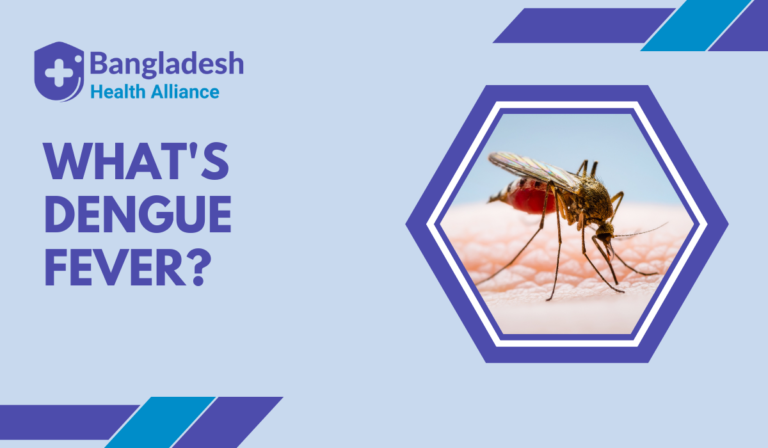Dengue fever, often referred to as “breakbone fever,” is a prevalent mosquito-borne viral illness that poses a significant health threat in numerous tropical and subtropical regions worldwide, including Bangladesh. As an active advocate for health awareness, the Bangladesh Health Alliance is pleased to present an in-depth exploration of what’s dengue fever. This comprehensive blog post will delve into the causes, symptoms, treatment, and prevention of dengue fever, offering valuable insights supported by scientific references, empowering you with essential knowledge about this disease.
Table of Contents
- What is Dengue Fever?
- Causes of Dengue Fever
- Symptoms of Dengue Fever
- Diagnosis and Medical Treatment
- Home Care and Natural Remedies
- Preventing Dengue Fever
What is Dengue Fever?
Dengue fever is a formidable infectious disease caused by the dengue virus, primarily transmitted through the bites of infected Aedes mosquitoes, with Aedes aegypti being the most notorious vector. Belonging to the Flaviviridae family, this virus comprises four distinct serotypes (DEN-1, DEN-2, DEN-3, and DEN-4).
Causes of Dengue Fever
The Aedes mosquitoes find fertile breeding grounds in urban and semi-urban areas, making their presence particularly pronounced in regions like Bangladesh. These mosquitoes become carriers of the dengue virus after biting an infected individual, enabling them to propagate the virus through their subsequent bites. Poor waste management, stagnant water, and warm climatic conditions exacerbate the proliferation of these mosquitoes.
Symptoms of Dengue Fever
Dengue fever typically manifests an array of symptoms, categorized into three phases: febrile, critical, and recovery. The febrile phase is characterized by high fever, severe headache, muscle and joint pain, and a distinctive rash. The critical phase can escalate into complications such as dengue hemorrhagic fever (DHF) or dengue shock syndrome (DSS), potentially leading to bleeding, organ impairment, and even fatality. The recovery phase sees a gradual abatement of symptoms, yet lingering fatigue and weakness might endure.
Diagnosis and Medical Treatment
Timely diagnosis is pivotal for effective management of dengue fever. Physicians rely on clinical assessments, blood tests, and molecular diagnostic techniques to confirm the presence of the dengue virus. Although specific antiviral medications remain elusive, medical interventions focus on alleviating symptoms, maintaining fluid equilibrium, and addressing complications, if they arise.
Home Care and Natural Remedies
In tandem with medical treatment, certain home care measures and natural remedies can aid the recovery process. Proper hydration, ample rest, and over-the-counter pain relievers play a role in managing fever and discomfort. While additional research is warranted, herbal remedies such as papaya leaf extract show potential in boosting platelet counts.
Preventing Dengue Fever
Prevention forms the bedrock of dengue fever control. By eradicating potential mosquito breeding sites—disposing of water-collecting containers, utilizing mosquito nets and repellents, and wearing protective attire—we can curtail the risk of mosquito bites. Community engagement, public awareness initiatives, and governmental interventions are pivotal in containing the spread of dengue.
Learn From Video – What’s Dengue Fever?
What are the signs and symptoms of dengue fever? By University College London Hospitals NHS Foundation Trust
Conclusion
To encapsulate, dengue fever looms as a significant health concern in locales like Bangladesh, where Aedes mosquitoes proliferate. Armed with knowledge about its origins, symptoms, treatment, and preventative strategies, we can collaborate to mitigate the impact of this disease. By fostering awareness, embracing preventive measures, and fostering community involvement, we can usher in a dengue-free environment. For further guidance and insights, it’s prudent to consult healthcare experts and local health authorities.
In combating dengue fever, knowledge is our foremost shield. Together, we forge a path toward championing public health and nurturing a future that is secure and brimming with vitality.
References:
- World Health Organization. (2021). Dengue and severe dengue. Link
- Centers for Disease Control and Prevention. (2021). Dengue. Link
- Ministry of Health and Family Welfare, Government of Bangladesh. (2021). National Guideline on Dengue Fever and Dengue Hemorrhagic Fever. Link
- Rajapakse, S., & Rodrigo, C. (2019). Dengue viral infections. Link


